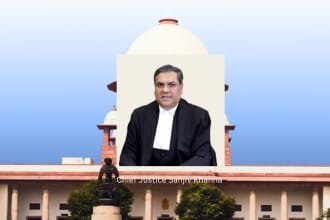In a significant ruling reinforcing the sanctity of judicial processes, the Supreme Court of India has held that persons who use forged or fabricated court orders to derive an undue advantage are guilty of criminal contempt—even if they are not the actual authors of the forged documents.
Background of the Case
The case—Shanmugam and Ors vs Madras High Court—arose from a civil rent dispute in Tamil Nadu. In 2004, a trial court passed a decree in favor of a trust for the recovery of rent arrears from tenants. Multiple appeals filed by the tenants were dismissed. Eventually, the trust initiated execution proceedings to enforce the 2004 decree.
However, the tenants sought to obstruct these proceedings by producing purported stay orders from the Madras High Court. Upon scrutiny, it was discovered that the documents relied upon were forged. These fraudulent documents were neither issued nor passed by the High Court.
This discovery led to the initiation of contempt proceedings against several individuals accused of either creating or using these forged documents to stall judicial enforcement. Although the contempt proceedings were initiated in 2018, formal notice was delayed until 2022 due to missing case files in the High Court’s registry.
Supreme Court Verdict: Key Highlights
On May 2, 2025, a Bench comprising Justices Sudhanshu Dhulia and Prashant Kumar Mishra upheld the Madras High Court’s conviction of three individuals for criminal contempt of court. The top court affirmed that the mere use of a fake court order—irrespective of authorship—constitutes contempt.
No Immunity for Non-Creators of Forged Orders
The Court decisively rejected the argument that a person who merely uses a fake order, without authoring it, cannot be held guilty of contempt. The Bench held:
“When a person is found to have utilised an order of a court which he or she knows to be incorrect for conferring benefit on persons who are not entitled to the same, the very utilisation of the fabricated order by the person concerned would be sufficient to hold him/her guilty of contempt.”
This clarifies that liability in contempt proceedings does not depend solely on authorship of forgery, but also on the knowing and deliberate use of forged judicial records.
Sanctity of Judicial Records Must Be Protected
Reiterating the critical need to uphold the integrity of judicial proceedings, the Court observed:
“Creating fake orders of the Court is one of the most dreaded acts of contempt of court. It not only thwarts the administration of justice, but it has inbuilt intention by committing forgery of record.”
The judgment emphasized that the credibility of the judicial process is deeply undermined when fabricated court orders are circulated to mislead litigants and judicial officers.
Limitation Argument Rejected
The contemnors argued that the contempt action was barred by limitation since the alleged acts occurred in 2018, while formal notice was issued only in 2022. However, the Supreme Court clarified that the initiation of contempt action occurred in 2018 itself, when the Madras High Court took cognizance of the offense.
Notably, the Court took a pragmatic approach by considering the delay in issuing notice as a consequence of administrative lapses (misplaced files), rather than legal inaction:
“The initiation of contempt action shall be treated to have been taken on 05.09.2018 … the present contempt action was not barred by limitation.”
This finding reinforces the principle that procedural delays should not be weaponized to escape liability in serious cases involving obstruction of justice.
Sentence Reduced from Six to One Month
While upholding the conviction, the Supreme Court showed leniency by reducing the sentence of simple imprisonment from six months to one month. The Court did not elaborate extensively on the reasons for reduction, but such decisions often consider mitigating factors such as age, cooperation, or lack of prior misconduct.
Legal and Practical Implications
This ruling carries several significant implications for litigants, lawyers, and judicial institutions:
- Zero Tolerance for Forgery in Court Processes: The Court has reiterated that the use of forged court documents, even by non-authors, will attract severe penal consequences.
- Clarification on Contempt Jurisdiction: The judgment provides clarity on when contempt proceedings are deemed to be “initiated” for limitation purposes, reinforcing judicial efficiency even amidst procedural delays.
- Deterrent Against Misuse of Court Processes: The ruling acts as a strong deterrent for litigants who attempt to gain illegal advantage by fabricating judicial orders or relying on manipulated documents.
- Protection of Judicial Integrity: By emphasizing the danger posed by forged court orders, the ruling seeks to protect the authenticity and finality of court proceedings—crucial pillars of the justice system.
Conclusion
The Supreme Court’s judgment in Shanmugam and Ors vs Madras High Court sends a powerful message against the misuse of judicial processes and underscores the seriousness with which the judiciary views attempts to forge or manipulate its orders. The Court has rightly prioritized the sanctity of court records and reaffirmed its contempt jurisdiction to punish acts that threaten the administration of justice.
In a legal landscape increasingly plagued by procedural abuses and document manipulation, this decision will stand as a precedent against fraudulent practices, ensuring that justice is neither delayed nor derailed by dishonesty.


